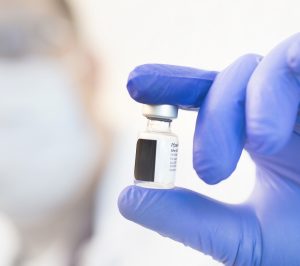Should I Get an Additional Dose of COVID-19 Vaccine?
 The U.S. Food and Drug Administration (FDA) and Centers for Disease Control and Prevention (CDC) now support booster doses of all three types of COVID-19 vaccine available in the United States. What does this mean, and who should get booster doses? Check out answers to frequently asked questions below.
The U.S. Food and Drug Administration (FDA) and Centers for Disease Control and Prevention (CDC) now support booster doses of all three types of COVID-19 vaccine available in the United States. What does this mean, and who should get booster doses? Check out answers to frequently asked questions below.
What is a booster shot?
“A booster dose of vaccine extends the protection offered by the initial dose or doses,” said Raj Govindaiah, MD, chief medical officer at Memorial Health. “It’s intended for people who had a strong immune response to their initial vaccination but may need additional protection over time.”
The COVID-19 vaccine is not the only type of vaccine that may require a booster dose. Booster doses are a very common way to extend the protection offered by vaccination over a longer timeframe. You have probably received booster shots for immunizations like Tdap (tetanus, diphtheria and pertussis) or MMR (measles, mumps and rubella) as a child or adult. Other types of vaccine, like the seasonal flu shot, are administered every year to ensure protection against variants of the virus.
The FDA and CDC have recommended booster doses of the Pfizer and Moderna vaccines for anyone 18 years or older.
They have recommended that everyone who received the Johnson & Johnson vaccine get a booster dose. This is because research shows that the Johnson & Johnson vaccine is somewhat less effective overall than the other two vaccines.
Who should get a booster shot?
Booster doses of Pfizer and Moderna vaccine are recommended for anyone 18 and older. Consult the CDC website for more details about who qualifies.
The FDA and CDC recommend that everyone who received the Johnson & Johnson vaccine should get a booster dose to extend their protection.
What is the difference between a third dose of COVID-19 vaccine and a booster shot?
The CDC and FDA have recommended that people who are immunocompromised should receive third doses of the Pfizer and Moderna COVID-19 vaccines. “This is not the same as a booster dose,” Dr. Govindaiah said. “Because immunocompromised individuals have weakened immune responses, they need three doses of the vaccine to achieve the same levels of protection that a person who is not immunocompromised would receive after two doses.”
A three-dose regimen of the Pfizer or Moderna vaccines is recommended for moderately to severely immunocompromised individuals – a group that is estimated to make up only about 3 percent of adults in the U.S. If any of the following statements apply to you, you should get a third dose. If you aren’t sure if you qualify, talk to your doctor.
- I am receiving active cancer treatment for tumors or cancers of the blood.
- I have received an organ transplant and am taking medicine to suppress my immune system.
- I have received a stem cell transplant within the last two years.
- I have moderate or severe primary immunodeficiency (such as DiGeorge syndrome, Wiskott-Aldrich syndrome).
- I have advanced or untreated HIV infection.
- I am undergoing active treatment with high-dose corticosteroids or other drugs that may suppress my immune response.
Does my booster dose have to be the same type of vaccine as my first dose(s)?
No. While the CDC recommends that you get a booster dose of the same type of vaccine you already received, it is not required if it is more convenient for you to get another type. So far, research hasn’t shown any medical advantage to getting the same type of booster as your original series.
Is there a specific timeframe in which I should get an additional dose of vaccine if I qualify?
If you qualify to receive a booster dose of Pfizer or Moderna because of your age or where you live or work, at least six months must have passed since the second dose in your two-dose series.
If you qualify for a three-dose regimen of Pfizer or Moderna because you are immunocompromised, at least 28 days must have passed since your second dose.
If you received the Johnson & Johnson vaccine, at least two months must have passed since your initial dose.
Can I get my seasonal flu shot or another vaccination at the same time as an additional dose of COVID-19 vaccine?
Yes. The CDC has determined that it’s safe and effective to receive the COVID-19 vaccine at the same time as another vaccination, including the flu shot, if you wish.
Where can I get a booster dose/third dose of the COVID-19 vaccine?
Booster doses are available at pharmacies and other locations around the area. Call before you go to determine availability. You can also sign up for a quick, convenient booster shot or third dose at the Memorial Drive-Thru Lab on South Sixth Street. Visit vaccination.mhsil.com to register.
I’m not sure if I should get a booster shot or not. What should I do?
“If you’re not sure whether you need a booster dose, talk to your doctor,” Dr. Govindaiah said. “Everyone has unique circumstances, and your doctor can help you understand your level of risk for COVID-19 and make the best recommendation for you.”